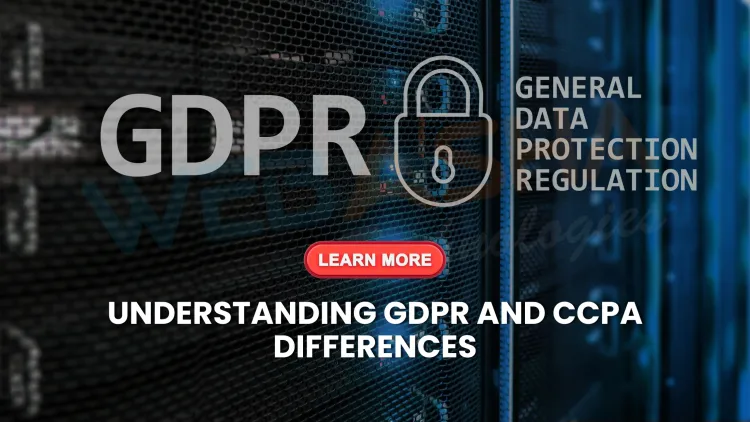What are the key differences between GDPR and CCPA in data protection laws?
Data protection and privacy laws like the General Data Protection Regulation (GDPR) and the California Consumer Privacy Act (CCPA) define how organizations collect, store, and use personal data. While GDPR applies to all EU citizens and requires active consent before data collection, CCPA gives California residents the right to know, delete, and opt out of the sale of their personal data. Both laws emphasize user rights, transparency, and organizational accountability, but differ in scope, enforcement, and consent models. Understanding and complying with these regulations is essential for global businesses handling personal information.

Table of Contents
- What Are Data Protection and Privacy Laws?
- Why Is Data Privacy Important in 2025?
- Overview of GDPR: General Data Protection Regulation
- Overview of CCPA: California Consumer Privacy Act
- GDPR vs. CCPA: Key Differences
- Other Important Data Privacy Regulations in 2025
- Real-World Example: GDPR Violation Case
- How to Ensure Compliance: Best Practices
- Common Challenges Faced by Businesses
- Top Tools for Privacy Compliance in 2025
- Future of Data Privacy Regulations
- Conclusion
- Frequently Asked Questions (FAQs)
In today's digital-first world, data privacy laws like the General Data Protection Regulation (GDPR) and the California Consumer Privacy Act (CCPA) are essential for safeguarding personal data. Whether you're a business collecting user data or an individual concerned about your digital footprint, understanding these frameworks is crucial.
This blog explores the core principles of GDPR and CCPA, compares their differences, and outlines how global businesses can comply in 2025.
What Are Data Protection and Privacy Laws?
Data protection laws are regulations designed to protect individuals' personal information from misuse, unauthorized access, or exploitation. These laws ensure transparency, user control, and accountability in how organizations process data.
Modern regulations like GDPR and CCPA empower users with rights and impose strict compliance obligations on businesses.
Why Is Data Privacy Important in 2025?
-
Cybercrime is rising — over 75% of global organizations experienced a data breach in the last 12 months.
-
Consumers are more aware of how their data is used.
-
Non-compliance can lead to massive penalties and loss of trust.
Protecting data isn't just about avoiding fines — it's about earning user confidence.
Overview of GDPR: General Data Protection Regulation
The GDPR, enforced by the European Union since May 25, 2018, is considered the most comprehensive data privacy law globally.
Key GDPR Principles:
-
Lawfulness, Fairness, and Transparency
-
Data Minimization
-
Accuracy and Integrity
-
Purpose Limitation
-
Accountability
Rights Under GDPR:
-
Right to access
-
Right to be forgotten
-
Right to rectification
-
Right to restrict processing
-
Right to data portability
-
Right to object to automated decisions
Who Needs to Comply?
Any organization — within or outside the EU — that processes personal data of EU residents.
Overview of CCPA: California Consumer Privacy Act
The CCPA, effective January 1, 2020, gives California residents specific rights about how their personal data is collected, used, and sold.
Key CCPA Rights:
-
Right to know what data is being collected
-
Right to delete personal data
-
Right to opt-out of data sale
-
Right to non-discrimination after opting out
Applicability:
Businesses must comply if they:
-
Earn $25M+ annual revenue
-
Buy/sell/share personal data of 100,000+ consumers
-
Earn 50%+ revenue from selling personal data
GDPR vs. CCPA: Key Differences
| Feature | GDPR | CCPA |
|---|---|---|
| Scope | EU citizens/residents | California residents |
| Consent | Required before processing | Opt-out model |
| Penalties | Up to €20 million or 4% of global turnover | Up to $7,500 per violation |
| Data Subject Rights | Broad, includes rectification and portability | Limited but strong opt-out provisions |
| Enforcement Authority | Data Protection Authorities (DPAs) | California Privacy Protection Agency (CPPA) |
Other Important Data Privacy Regulations in 2025
-
India’s DPDP Act – Consent-based processing and strict localization.
-
Brazil’s LGPD – Similar to GDPR, applies to Brazilian citizens.
-
Canada’s PIPEDA – Focuses on meaningful consent and accountability.
-
China’s PIPL – Extensive control over cross-border data transfers.
Real-World Example: GDPR Violation Case
In 2023, Meta (Facebook) was fined €1.2 billion under GDPR for improper handling of EU user data transferred to the U.S. without adequate safeguards. This marked the largest GDPR fine ever issued and highlighted the importance of data localization and contractual safeguards.
How to Ensure Compliance: Best Practices
1. Conduct a Data Audit
Identify all personal data you collect, how it's stored, and who accesses it.
2. Update Your Privacy Policy
Clearly state how you collect, use, share, and store data in simple language.
3. Implement Consent Mechanisms
Use cookie banners, opt-ins, and granular consent controls for data processing.
4. Enable Data Subject Rights
Provide easy-to-use forms for data access, deletion, and portability requests.
5. Use Secure Processing Methods
Encrypt sensitive data, monitor access logs, and use Data Loss Prevention (DLP) tools.
6. Appoint a Data Protection Officer (DPO)
For GDPR compliance, especially if processing sensitive or large-scale personal data.
7. Train Employees
Educate your team on data privacy responsibilities and security best practices.
Common Challenges Faced by Businesses
-
Managing cross-border data transfers
-
Keeping up with regulatory changes
-
Responding to data subject requests within strict timelines
-
Handling third-party vendors that process personal data
Top Tools for Privacy Compliance in 2025
| Tool | Purpose | Key Features |
|---|---|---|
| OneTrust | GDPR & CCPA compliance management | Cookie consent, privacy rights workflows |
| TrustArc | Privacy assessments and impact analysis | RoPA, DPIA, breach management |
| Osano | Consent management & policy generation | Cookie scanning, opt-out mechanisms |
| Vanta | Security audits and compliance tracking | SOC 2, ISO 27001, GDPR documentation |
| DataGrail | Data mapping and user request handling | Automates DSR workflows across apps |
Future of Data Privacy Regulations
As AI and IoT evolve, data protection laws will become stricter and more globally synchronized. Businesses must design privacy into products — also known as Privacy by Design — and adopt a zero-trust approach to data management.
Conclusion
Navigating privacy laws like GDPR and CCPA is no longer optional — it’s a core component of operating in the digital economy. By embedding compliance into your systems, training, and workflows, you not only avoid legal issues but also build customer trust.
FAQs
What is GDPR and why is it important?
GDPR is the General Data Protection Regulation implemented by the European Union to protect the personal data and privacy of individuals. It ensures strict controls over how organizations collect and process data.
What does CCPA stand for?
CCPA stands for the California Consumer Privacy Act, which grants California residents rights over how their personal data is collected, sold, and used.
How does GDPR differ from CCPA?
GDPR requires prior consent to collect data, while CCPA allows users to opt out. GDPR applies globally to EU residents' data, whereas CCPA is limited to California residents.
Who needs to comply with GDPR?
Any organization, regardless of location, that processes data of EU residents must comply with GDPR.
Who must follow CCPA regulations?
Businesses with revenue over $25 million, or that handle data of over 100,000 California residents, or earn more than 50% of revenue from selling data must comply.
What is considered personal data under GDPR?
Personal data includes any information related to an identifiable person—like name, email, IP address, or location data.
What is the penalty for violating GDPR?
Organizations can face fines up to €20 million or 4% of their global annual turnover, whichever is higher.
What are the fines for violating CCPA?
Fines can reach up to $7,500 per intentional violation and $2,500 per unintentional violation.
What rights do users have under GDPR?
Users have rights including access, rectification, deletion, data portability, and objection to data processing.
What rights does CCPA give to consumers?
CCPA allows users to access, delete, and opt out of the sale of their personal data and prohibits discrimination for exercising these rights.
Is consent required under CCPA?
CCPA uses an opt-out model; businesses must allow users to opt out of data sale but don't require explicit consent before collecting data.
What is a DPO in GDPR?
A Data Protection Officer (DPO) is responsible for overseeing an organization's data protection strategy and GDPR compliance.
Can small businesses be affected by GDPR?
Yes, if they process data of EU residents, even small businesses must comply with GDPR.
Does CCPA apply to non-U.S. companies?
Yes, if a non-U.S. company processes data of California residents and meets CCPA thresholds, it must comply.
What is “Privacy by Design”?
Privacy by Design is a principle under GDPR where data protection is integrated into system design from the start.
How do I make my website GDPR compliant?
Implement consent banners, clear privacy policies, secure processing methods, and allow users to exercise their rights.
How can users opt out under CCPA?
Websites must provide a “Do Not Sell My Personal Information” link to let users opt out of data sale.
What are RoPA and DPIA in GDPR?
RoPA (Records of Processing Activities) and DPIA (Data Protection Impact Assessment) are required documents under GDPR to assess and record data processing risks.
What is data minimization in GDPR?
Only collect data necessary for your specific purpose—no excessive or irrelevant information should be stored.
Is IP address considered personal data?
Yes, under GDPR and CCPA, IP addresses are considered personal identifiers.
Can I request my data from a company?
Yes, both GDPR and CCPA grant you the right to access the data a company holds on you.
How long can personal data be stored?
Only as long as necessary. GDPR mandates data retention policies and justifications for storing user data.
What is the “Right to Be Forgotten”?
This is a GDPR right that allows users to request the deletion of their personal data from a company’s records.
How do businesses verify user identity for data requests?
They use multi-factor verification methods to ensure data access requests are genuine.
Are email addresses protected under privacy laws?
Yes, email addresses are considered personal data and protected under both GDPR and CCPA.
What is a Data Subject Request (DSR)?
A DSR is a request made by an individual to access, delete, or modify their personal data under GDPR or CCPA.
Do GDPR and CCPA apply to employee data?
Yes, both laws apply to employee data, though there are different rules and exemptions depending on the jurisdiction.
Can a user sue under GDPR?
Yes, individuals can file complaints with Data Protection Authorities or seek compensation for violations.
What’s the role of cookies in GDPR and CCPA?
Cookies collect personal data and thus fall under privacy regulations. Consent (GDPR) or opt-out (CCPA) is required.
Are there tools to automate privacy compliance?
Yes, tools like OneTrust, TrustArc, Osano, and Vanta help automate GDPR and CCPA compliance workflows.














![Top 10 Ethical Hackers in the World [2025]](https://www.webasha.com/blog/uploads/images/202408/image_100x75_66c2f983c207b.webp)








